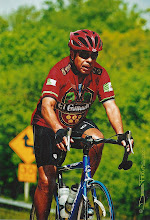My times at Lucky Hill were mostly day trips with an occational summer vacation here and there. But one time I had to spend a whole year there for I remember going to Jeffery Town school there and in fact getting into my first school fight.
I can’t remember the circumstance under which I was sent to Lucky Hill to live but such was the life for myself and my nearest sibling. We both had episodes where we spent a lot of our childhood living away from our parents. His periods in Lucky Hill were much longer, more frequent and emotionally daunting than mine. But none the same I found mine was non the less vexing. Even as a child you realise that Lucky Hill life was not attracting. It was bush; there was no electricity, no running water, only an out door latrine and the kitchen was a shack with dirt floor and only wood fires, no stoves. I think I must have been about the age of 8-9 years old then and in fourth or fifth grade/class. I don't know the exact age I was then or what grades the school covered (it more than likely covred everything that was considered elementary or primary education) I only remembered that I was not old enough to play with the bigger boys but also was not in one of the younger grades.
Life in Lucky Hill meant hard work. A typical school day meant getting up before the sun comes up, and doing your chores around the house. This could mean going to the river to get water, chopping wood for fire for the day, finding the goats or donkeys or whatever animals that were tied out in one of the fields closer to the house and moving them to newer and fresher pasture or helping out in the kitchen to get the morning meal going. These were the chores for the smaller kids, the older ones had to go father and do a lot more. Only when your chores were all done that you could you could then wash up and put on your school clothes and go to school; which was a good three mile walk. When school was over there was no staying back for sports or any extra activities. You expected to hurry home to get your evening chores (planting, picking, weeding, feeding, etc.) done before night fall.
Then on Friday all activities reached a new frenzy as the final preparations were made to get ready to go to market on Saturday. All the stuff that you would be selling had to be gathered from the different fields and the hampers packed and ready for next morning. It was also the night that you did your cooking of coconut oil. This was our main cash crop so all hands were needed. Everyone would be up half the night grating, straining and boiling the extracted coconut milk down into oil. Then early next morning while it was still dark out you would be awaken to get the donkeys loaded and your bundle that you would be carrying on your head ready and then off to market you would go, trudging behind the donkey. And market was no 'round the corner, it was miles away.
Going to market to sell was not a favorite time for me. I was never any good at it and felt totally out of palace. It was not my thing then and is still not today. I am not sure why but I saw no thrill in it nor was I any good at it. Fortunately, either because of my resistance, demeanor, performance or simple ineptitude but I was not frequently selected to go to market. To this day I still find the task of selling very daunting. My wife just has to mention her intention of having a garage sale and I will find every excuse to disappear for the day.
But what I found even uglier than going to market was walking behind the donkey. This felt like the lowliest of the low and this feeling has stuck with me through the years. It became my point of reference for every disappointment. When I was in high school and could not afford football boots or track shoes or just lunch money for that day I always felt that things were still not so bad for at least I was still not walking behind a donkey. And even today when I am passed over for a promotion or endured some perceived slight my knee-jerk reaction is to turn the situation into a positive and commend myself on my accomplishments of how far I have come… from walking behind a donkey.
Do not get me wrong, Lucky Hill was not all that bad. For one, you were never alone. There were five of us kids there, so you were never doing a chore alone and being kids you could make a game out of anything. Even the night before market when you would stay up half the night boiling coconut oil would be fun. We would all be sitting around the fire, husking, grating, straining and cooking; everyone would be working but at the same time we would all be talking and telling stories and before you know it the night went by. We did not know it then but it was quality time, a bonding that cemented the family structure. I guess it is a part of what I am trying to recapture in these bloggs.
Oh, I forgot to tell you about my first fight. I will save that for next time.
Read more!




.jpg)